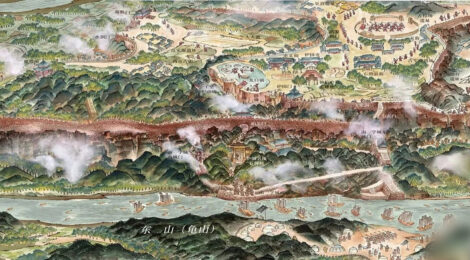
Fishing City with its splendid history
Dear readers, have you ever run a marathon? This year, many places in Chongqing held sports competitions with their own characteristics, among which Hechuan District held a half marathon for the first time, attracting a lot of attention. Marathon is a sport with high requirements for willpower, just like what Hechuan people had in the thirty-six years of persistence against the Mongol aggression seven hundred years ago. We’d like to take this opportunity to share with you the past stories that happened in Hechuan Fishing City.
In the 13th century, coinciding with the Little Ice Age, the strength of agricultural civilization was weakened, and the nomads had to expand their territory in order to survive. In 1206, Genghis Khan ended the melee among the tribes on the grassland and established Mongolia, and the Mongols gradually became the protagonists on the world stage. By 1240, the Mongol Empire had included Kiev, the Caspian Sea, and Syria in its sphere of influence, but the death of the second Great Khan, Ogodei, in 1241 caused infighting within the ruling group, and the Mongol Cavalry halted its westward campaign. Eventually Ogodei’s eldest son, Kayu, ascended to the throne of Great Khan, but was replaced only three years later by Mongke.
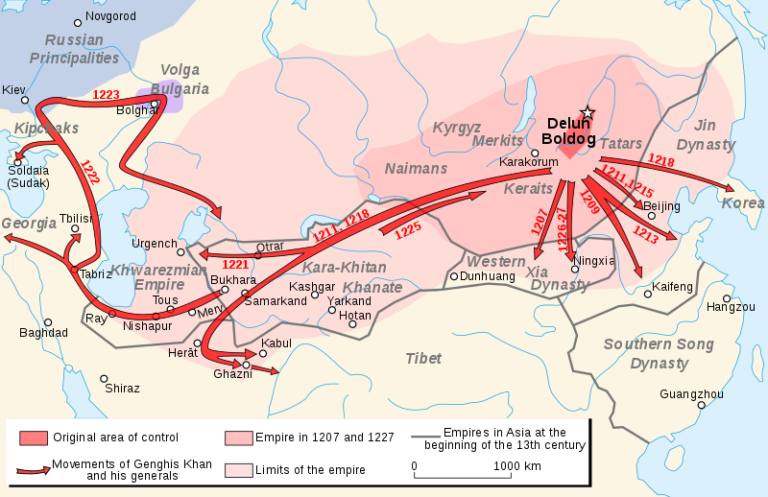
In 1251, after Mongke became the third Great Khan, he followed Genghis Khan’s wish of expansion and continued his campaign. He sent his second brother Hulagu to the west and his third brother Kublai to the southwest to capture Dali City (now Yunnan area), while he himself led the main army to the south, planning to conquer Sichuan and Shu and then descend down the Yangtze River, join other forces in the middle reaches of the Yangtze River, destroy the Southern Song Dynasty at one stroke, and rule the whole of China.
Before this, the Mongolian and Song had fought several times, and in 1234, they jointly destroyed the Jin State of Nuzhen, but the Southern Song had already been weakened in national strength for different reasons – internal political strife, civil and military discord, and poor local governance. The Mongolian army seized the weakness of the Song army and successively conquered towns in the Central Plains from the north to the south. By 1241, the Mongolian army had massacred and looted more than 200 cities in the Sichuan and Shu regions, with heavy casualties.
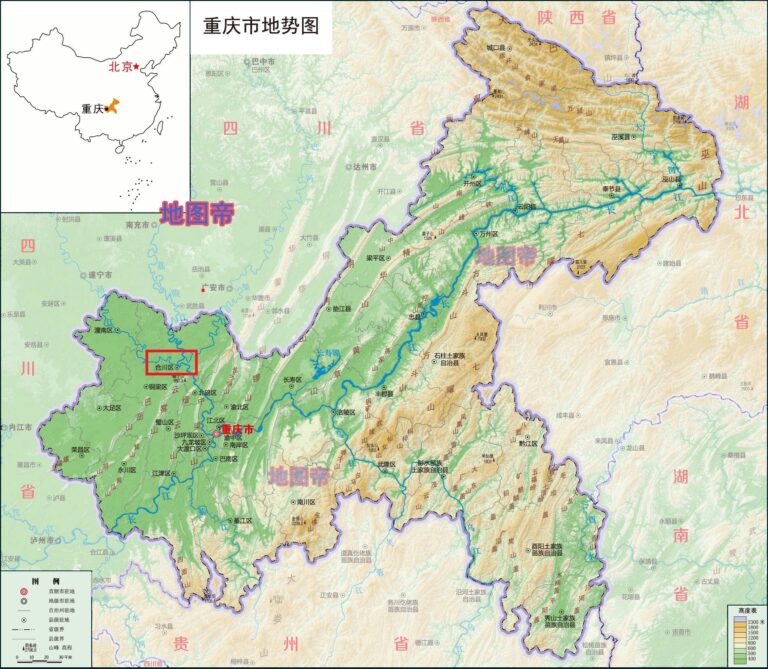
At the end of 1258, Mongke himself led 40,000 troops to the Fishing City, the last fortress in the Song army’s defense line. Fishing city, now located in the northwest of the main city of Chongqing Hechuan District. The name Hechuan (合hé 川chuān) comes from its geographic position being in the confluence of Jialing River, Fujiang River and Qujiang River. Fishing city is built on Fishing Mountain, five kilometers from east of Hezhou city. The mountain was named after a legend. In ancient times, a large number of victims fled to the mountain to escape the flood but soon faced with food shortage. Seeing this, the god came sitting on top of the mountain and fished from the Jialing River fishing for people to eat. Later people call the place where the god fished Fishing Terrace(Diaoyutai), the mountain Fishing mountain. In 1240, Wang Jian, the Governor of Hechuan mobilized 170,000 soldiers and civilians to build a fortress in the Fishing city. Before Mongke came to the city in 1258, Wang had built the Fishing city into a fortress with walls on the cliff, with fertile fields, more than ten ponds, nearly a hundred Wells, and a lot of grain. After years of mashing by the Mongolian army, it was never conquered.
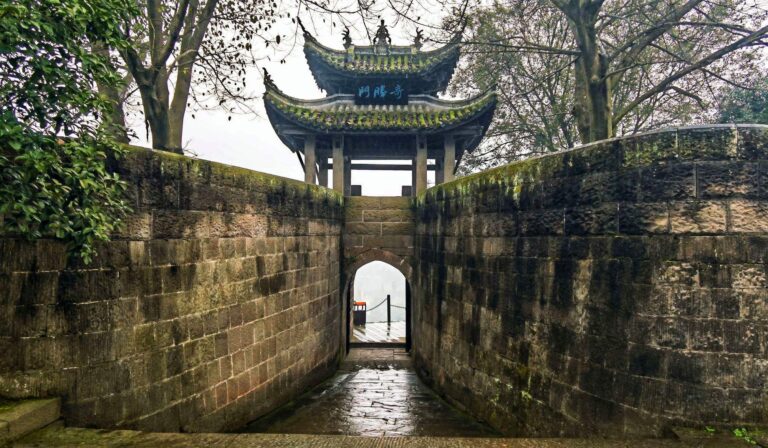
In February 1259, the Mongke army launched a fierce offensive against the Fishing city. However, as there was no support on the cliff for ladders and the tower was too narrow to advance and retreat, a victory was not possible for a long time, even if Mongke came in person. The fighting continued into April. There was a truce of more than twenty days because of the heavy rain. On 24 April, the Mongolian army landed by water but were recaptured by warriors led by Wang Jian. In May, the hot weather brought an outbreak of plague among the Mongolian soldiers. Wang Jian seized the chance with a surprised night attack, coupled with the surrounding Song army to support the Fishing city, launching a fierce battle with the Mongolian army in the Jialing River. Although the Song army failed to achieve a decisive victory, the aggression from the Mongolian army was blocked for a moment . At this time, some advisors of Mengge suggested besieging the city and not attacking it until more than 100,000 soldiers and civilians in the city had run out of their supplies. However, on one day in June, Wang Jian sent men to throw two big fish weighing 30 kilograms and more than 100 pieces of bread from the tower, and attached a letter, which read, “the city won’t be captured even If you attack for another ten years.” This move gave Mongke the idea of building a high platform on the opposite shore of the Fishing city to spying on the city. In the middle of July, the high platform was built, and on July 21, Mongke personally took the stage unto the platform. On the sight of people showing on the stage, Wang Jian immediately ordered his subordinates to pour out the cannon stones that had been prepared for a long time, and the climbers including Monge fell immediately to the ground. On July 27, Mongke Khan died of his wounds in the mountains near the Fishing city.
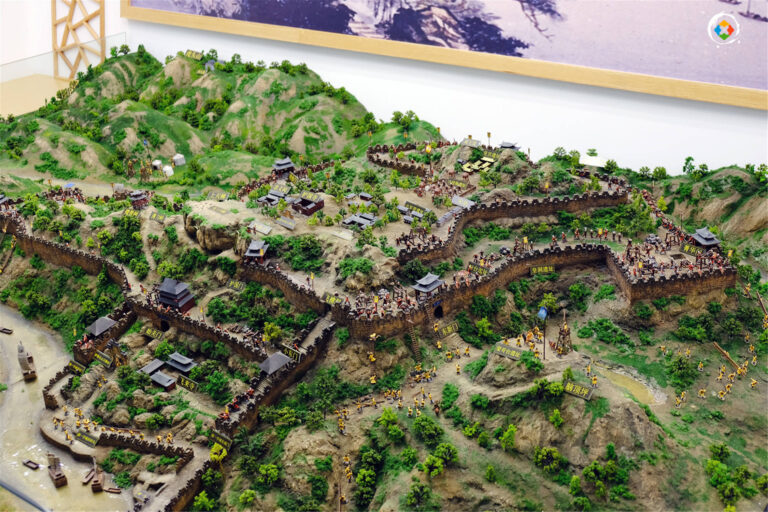
As for his death, some historical recorded that he died of a plague to cover up his disgraceful death, but it is more plausible that he was wounded by a cannon stone, and his last words “the city, if conquered, shall be destroyed”, indicate his anger at the Fishing city. On the other hand, his sudden death without leaving words on choice of his successor had a huge impact on the internal affairs and foreign expansion of Mongolia.
His brothers Kublai Khan and Ariq fought an all-out civil war for the throne. Kublai Khan, who had already gained a strategic advantage in the war to destroy the Southern Song, broke off the attack and withdrew from the north overnight, giving the Southern Song the chance to continue its reign until 1279.
The four major Khanates established during the Mongol expedition to the West – the Khanate of Kipchak (later called the “Golden Horde”), the Khanate of Ogodei, the Ilkhanate (also known as the “Ili Khanate”), and the Chagatai Khanate – were divided into two factions, the first two supporting Ariq, and the Ilkhanate supporting Kublai Khan. Despite the victory of Kublai Khan, the status of the Mongol Great Khan was gone forever, and the Mongol Empire split from a unified whole into four independent khanates, which set the stage for the disintegration of the later Mongolian power after the decline.
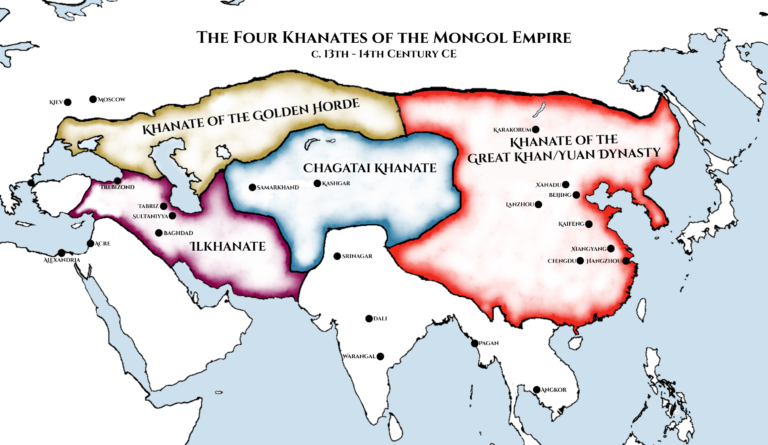
At the time of Mongke’s death, his brother Hulagu had gone west to Iraq, and most of the Syrian territory had been conquered by him. On hearing of Mongke’s death, he quickly led the main forces back to the east, attempting to join the battle for the Khan throne, but due to the long distance, he only received the news of Kublai Khan’s accession in the middle of the journey, and he could only turn to support Kublai Khan. The Iraq and Syria that had been conquered by him gradually recovered their strength and defeated the remaining Mongol armies, thus the Arab civilization survived, and some Christian civilizations in farther west area were spared the from the Mongol aggression.
After this, the army and people of the Fishing city continued to fight until 1279. Due to two years of drought, the city ran out of food and other supplies, and the last commander Wang Li surrendered on the condition that “no one in the city shall be killed”. From 1243 to 1279, after 36 years, the Fishing city was never conquered from the outside by the Mongolian army, which can be described as a miracle city in the history of world war. People in the city had carved a monument for Wang Jian. Unfortunately, as there were derogatory words of the Mongolian army, the monument was damaged in the Yuan Dynasty, and only 7 characters were left to be recognized.
Now the remains in Fishing city has become a famous historical and cultural scenic spot in Hechuan District. Besides the war remains, there are also Buddhism, Taoism and other ancient inscriptions in the spot for visiting. Fishing city, with its unique geographical location and role in history, has become an memorable page in the history of Song and Yuan Dynasties, waiting for readers to explore.
Written by Zhang Yangxin and translated by Mo Surong



